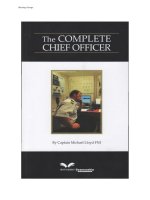The complete chief officer 18 fatigue
Bạn đang xem bản rút gọn của tài liệu. Xem và tải ngay bản đầy đủ của tài liệu tại đây (113.37 KB, 2 trang )
18 Fatigue
The two most important factors affecting safety are manning and fatigue.
18.1 The Effects of Fatigue
From MSC/Circ 1014: Alertness is the optimum state of the brain that
enables us to make conscious decisions. Fatigue has a proven
detrimental effect on alertness - this can be readily seen when a
person is required to maintain a period of concentrated and sustained
attention, such as looking out for the unexpected (eg night watch).
When a person's alertness is affected by fatigue, their performance on the job can be
significantly impaired. Impairment will occur in every aspect of human performance
(physically, emotionally and mentally) such as in decision-making, response time,
judgement, hand-eye coordination and countless other skills.
Fatigued individuals become more susceptible to errors of attention and memory (for
example, it is not uncommon for fatigued individuals to omit steps in a sequence).
Chronically fatigued individuals will often select strategies that have a high degree of risk on
the basis that they require less effort to execute.
Fatigue can affect an individual's ability to respond to stimuli, perceive stimuli and interpret or
understand stimuli, and it can take longer to react to them once they have been identified.
Fatigue also affects problem solving, which is an integral part of handling new or novel tasks.
Fatigue is known to detrimentally affect a person's performance and may reduce individual
and crew effectiveness and efficiency, decrease productivity, lower
standards of work and even lead to errors being made. Unless steps are taken to alleviate
the fatigue, it will pose a hazard to ship safety.
104
18.2 Safe Working Ethics
Many of the jobs that will be done on the ship are unsafe. Simply being at sea on some
ships can be called that. If we accept this then, no matter what we do, we cannot make
many of these tasks completely safe. However, we can ensure that equipment and tools are
correct and safe and that the correct PPE is worn.
The next question is whether or not those about to use the equipment actually know how to
use it? This might seem a little strange but, as an example, can the trainee rig the Bosun's
chair properly? It is a bit late finding out when it is slipping twenty metres above the deck.
The weather must also be considered. If you are taking seas and rolling or pitching heavily,
you must consider whether, the work is so essential that it must be done and the risk
accepted.
Risk Assessment, when used sensibly, can be of benefit. If you find that you disagree with the
assessment of any item or practice, you must advise the safety officer and make a
reassessment. If this reassessment involves any work that could endanger life, before it is
distributed you should advise the Master of the proposed changes and the reasons why.
Properly used, the assessment should only take a few minutes before commencing any job,
but it is important that the crew and you are reminded of the important factors of the intended
task.
In the event of any accident the shore investigators will review your assessment, so be
careful. It is better to follow the rules than to risk life and your career to save few minutes of
time, regardless of how hard you are pressed. Of course there are urgent circumstances
when action must be taken immediately and there is no time for such assessment. At sea,
we all know that but, unfortunately, it is difficult to simulate the urgency of the moment in the
quiet hush of the office ashore or a courtroom.
105









